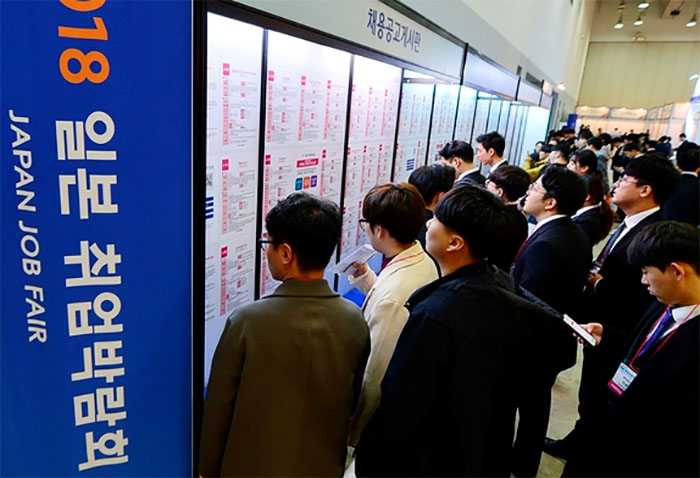Why Youth Unemployment Is Higher in Korea Than in Japan
06 December, 2018

One reason for Korea's high youth unemployment despite a shortage of workers in smaller firms is the vast wage gap between big and small businesses.
Workers in Japan's small and mid-sized businesses earn 80 percent of what staff at large conglomerates make, and starting pay is about the same. But in Korea, workers in SMEs earn just half of what their counterparts in big conglomerates make, and starting pay is only 60 percent.
This is why young Koreans compete so hard for the limited job openings at major conglomerates, and why the snob value is so much higher, which has ended up exacerbating youth unemployment.
Unemployment among Korean men in their late 20s reached 11.6 percent last year and among women 7.1 percent. In contrast, unemployment among Japanese men and women in the same age group stood at just 4.3 and four percent.
Baak Saang-joon at Waseda University in Japan and Kim Nam-joo and Jang Keun-ho at the Bank of Korea in a report on Wednesday showed how the wage gap between big and small businesses is one of the main culprits for high youth unemployment here.
Jobseekers read a bulletin board at a job fair at the Busan Exhibition and Convention Center in the southern port city on Nov. 5.
Not only do large businesses in Korea offer higher starting pay, salaries also increase at a faster rate than in SMEs. Also, militant unions spearhead wage negotiations, resulting in wages growing faster, while they in turn squeeze their smaller suppliers to save costs.
SMEs in Japan have been able to maintain pay levels equivalent to 80 percent of wages at big businesses over the last two decades, while in Korea they were equivalent to just 55 percent.
Permanent staff at major Korean conglomerates earned W3.98 million a month as of 2017, while their counterparts at SMEs make W2.64 million. Starting pay at big businesses stands at W40.8 million a year compared to W25.3 million at smaller firms. Over the last five years, wages at SMEs and big businesses in Japan grew at about the same pace. But in Korea, wage growth at big businesses was a whopping 3.5 times faster than in small and mid-sized companies.
Analysis by the Korea Small Business Institute shows that wages grew 12 percent at big businesses in Japan and 10 percent in SMEs from 2010 to 2015. But in Korea they grew 29 percent at big businesses and just eight percent at smaller firms. That meant Korean staff earned on average W4.37 million a month after five years in the job at at large conglomerates, but in SMEs their salaries rose to just 2.27 million in that time.
"This is why young jobseekers prefer to wait until they can land jobs in big conglomerates," the researchers said.
But only 14 percent of total jobseekers find employment at big businesses, while in Japan the ratio is over 32 percent. Kim at the BOK said, "In Korea, not only is there a huge wage gap between small and big businesses, but the number of jobs offered by big companies is limited resulting in a lengthy period of unemployment among young jobseekers."
TAG(s):
